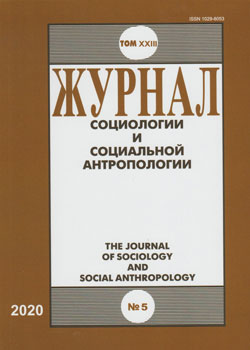Corruption and Anti-Corruption Policy Perception in Russians’ Mass Consciousness
Аннотация
Литература
Devyatkin A.A. (1999) Yavlenie sotsial'noi ustanovki v psikhologii XX veka [Social attitude as a phenomenon in 21 century psychology]. Kaliningrad: KSU (in Russian).
Dungan J., Waytz A. Young L. (2014) Corruption in the Context of Moral Trade-offs. Journal of Interdisciplinary Economics, 26(1-2): 97-118.
Friedrich C.J. (2005) Corruption in Historical Perspective. In: Heidenheimer A.J., Johnston M. (eds.) Political Corruption: concepts and contexts. Third Edition. New Brunswick and London: Transaction Publishers: 15-24.
Ghatak A., Iyengar S. Corruption Breeds Corruption. Studies in Microeconomics, 2(1): 121-132.
Kirpichnikov A.I. (1997) Vzyatka i korruptsiya v Rossii [Bribe and corruption in Russia]. St. Petersburg: Alfa (in Russian).
La Piere (1934) Attitudes vs Actions. Social Forces, 13(2): 230-237.
Мartynov М.Y., Gaberkorn A.I. (2017) Osobennosti vospriyatiya rossiyanami korruptsii [Features of mass consciousness perception of corruption in Russia]. Sotsiologicheskiye issledovaniya [Sociological Studies], 6: 79-84 (in Russian).
Menshenina N.N. (ed.) (2014) Korrupciya v Rossijskoj Federacii: genezis, formy, tekhnologii, protivodejstvie [Corruption in the Russian Federation: Genesis, forms, technologies, anti-corruption]. Ekaterinburg: Izdatel'stvo Ural'skogo universiteta (in Russian).
Nisnevich Y.A. (2016) Korruptsiya: instrumental'naya kontseptualizatsiya [Corruption: instrumental conceptualization]. Sotsiologicheskiye issledovaniya [Sociological Studies], 5: 61-68 (in Russian).
Olken B. (2009) Corruption perceptions vs. corruption reality. Journal of Public Economics, 93(7-8): 950-964.
Park H., Lee J. (2017) The influence of media, positive perception, and identification on survey-based measures of corruption. Business Ethics: A European Review 26(3): 312-320.
Rose-Ackerman S. (1999) Corruption and Government: Causes, Consequences, and Reform. Cambridge: Cambridge University Press.
Rossiya i korruptsiya: kto kogo. Analiticheskii doklad [Russia and corruption: Who beats who. An analytical report] (1998) Indem Foundation [http://www.indem.ru/indemfond/indfp2_r.html ] (accessed 29 December 2018) (in Russian).
Satarov G.A. (2013) Rossiiskaya korruptsiya: uroven', struktura, dinamika. Opyty sotsiologicheskogo analiza [Corruption in Russia: rate, structure, dynamics. A sociological analysis]. Moscow: Fond «Liberal'naya missiya» (in Russian).
Solomon P.H.Jr., Gadowska K. (2018) Legal change in post-communist states: Contradictions and explanations. Introduction. Communist and Post-Communist Studies, 51(3): 173-176.
Thomas W., Znaniecki F. (1927) The Polish Peasant in Europe and America. Vol. 1. Second edition. New York: Alfred A Knopf.
Yadov V.A. (1979) Samoregulyatsiya i prognozirovanie sotsial'nogo povedeniya lichnosti [Self-regulation and forecasting social behavior of an individual]. Leningrad: Nauka (in Russian).
Zadorin I.V., Matskevich M.G. (2017) Obshchestvennoe vospriyatie vozmozhnykh izmenenii v ugolovnom pravosudii: rezul'taty sotsial'no-psikhologicheskogo eksperimenta [Public perception of possible changes in the criminal justice: Results of social and psychological experiment], Zircon Research group [http://www.zircon.ru/upload/iblock/8bc/pravosudie_tezisy_Kovalevskie_cht... ] (accessed 29 December 2018) (in Russian).
Zhuravlev A.L., Yurevich A.V. (2014) Psikhologicheskie faktory korruptsii [Psychological factors of corruption]. Sotsiologicheskiye issledovaniya [Sociological Studies], 7: 63-71 (in Russian).






